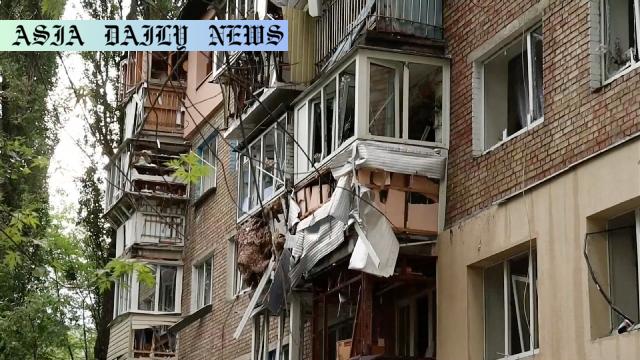Kyiv attacks – Russia launched 250 drones and 14 ballistic missiles targeting Ukraine’s capital in one of the largest attacks reported.

Massive Assault on Kyiv: Unprecedented Drone and Missile Strikes
In a catastrophic escalation of hostilities, Russia unleashed one of its largest attacks against Ukraine’s capital, Kyiv, this weekend. Utilizing overwhelming numbers of drones and ballistic missiles, Russian forces initiated a coordinated offensive that resulted in widespread fear and significant damage to the city. According to reports from Ukrainian officials, an estimated 250 drones, combined with 14 ballistic missiles, were directed at Kyiv, marking it as one of the most intensive assaults since the invasion began in early 2022.
Fragments of shot-down drones and missiles caused collateral destruction, shattering apartment windows and damaging housing complexes. While the Ukrainian military reported successful interceptions of much of the incoming arsenal, the destruction amplified the psychological toll endured by the city’s nearly three million residents. The aftermath revealed at least 15 injuries among civilians, further fueling anger and calls for heightened international scrutiny of Moscow’s aggressive behavior.
Calls for Accountability Amidst Rising Tensions
Ukraine’s Foreign Minister, Andrii Sybiha, confirmed the injuries and deplored the attack for its reckless disregard for civilian lives and infrastructure. Ukrainian President Volodymyr Zelenskyy, in a stern statement on social media, called for stricter punitive measures against Russia, highlighting how continuous sanctions could compel Moscow to cease its belligerence. This sentiment resonates with Ukraine’s long-standing appeal to the global community for more decisive and unified actions.
Zelenskyy underscored the causal relationship between Moscow’s aggression and the prolonged nature of the war. He urged Western allies to consider targeting sectors integral to Russia’s economy more aggressively, believing this would exert necessary pressure. Kyiv’s persistence in advocating for international solidarity against Russia remains undeterred even in the face of recurring attacks.
Prisoner Exchange Brings Faint Hope Amid Chaos
In a contrasting development, Ukraine and Russia announced progress in humanitarian channels as the two nations finalized a prisoner exchange agreement. On Friday alone, 390 prisoners of war and civilians were returned to their respective countries, shedding rare light on diplomacy amidst ceaseless violence. This exchange was part of an ongoing agreement aiming to release 1,000 prisoners in total, demonstrating that dialogue persists despite the continuous warfare.
Russia’s Foreign Minister, Sergey Lavrov, suggested that Moscow would provide a draft ceasefire arrangement once the prisoner exchange process was fully completed. However, given the sheer scale of ongoing attacks on Kyiv, skepticism surrounding Russia’s intentions continues to dominate the discourse. Observers note that while exchanges provide a glimmer of humanity in dire circumstances, they do little to address the root causes of the conflict, leaving future prospects uncertain.
The Path Forward in a Protracted Conflict
As Kyiv endures yet another immense wave of aggression, questions surrounding the global response to the war in Ukraine persist. Opinions vary widely on how to appropriately address the geopolitical and humanitarian crisis caused by the invasion. Sanctions, military aid, and diplomatic negotiations remain pivotal tools in influencing the conflict’s trajectory.
Meanwhile, cities like Kyiv are left to grapple with the visible and psychological scars each attack leaves behind. From damaged infrastructures to wounded citizens, the stories of resilience etched by this war reflect both the tragedy of its persistence and the unwavering determination of the Ukrainian people.
Commentary
A Brutal Reminder of War’s Devastation
The attack on Kyiv is a brutal reminder of the unrelenting destruction that war brings. As we absorb the statistics—250 drones, 14 ballistic missiles—it’s easy to lose sight of the human element behind these figures. Residential buildings damaged, lives uprooted, and families living in perpetual fear speak volumes about the real impact. These attacks transcend mere military strategy; they illustrate the underlying disregard for civilian safety, underscoring the merciless nature of modern warfare.
The Role of Global Solidarity
President Zelenskyy’s call for increased sanctions is a necessary plea against a backdrop of escalating violence. The international community has a moral obligation to respond assertively when a nation’s sovereignty is consistently challenged. However, beyond sanctions, broader collaboration is required to prevent prolonged suffering. Aid in the form of defensive technologies and rebuilding efforts must accompany economic constraints on aggressors to ensure a holistic response.
Faint Hopes Amid Adversity
Among the chaos, news of the prisoner exchange comes as a sliver of hope. While it highlights that dialogue can exist between adversaries, the larger question remains—how do we steer that dialogue towards tangible conflict resolution? Diplomatic efforts must focus on creating avenues for sustainable peace rather than temporary compromises. The exchange underscores the latent potential for shared humanity, even amidst discord.
Conclusion
As Kyiv rebuilds yet again, its resilience symbolizes hope for an eventual end to this conflict. However, hope alone is insufficient to turn the tides. Strategic international intervention, continued solidarity, and an unwavering focus on peace are all vital. Only then can we hope to witness a cessation of attacks like this one and, more importantly, the end of a war that has already claimed far too much.


